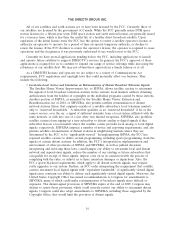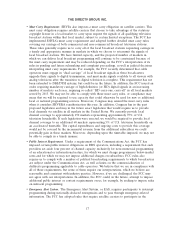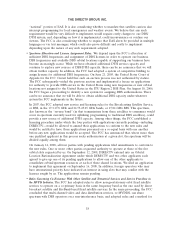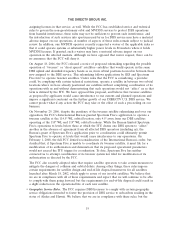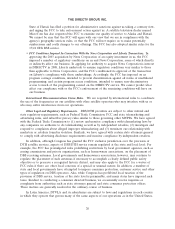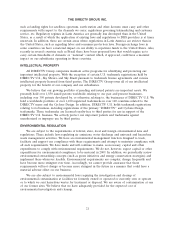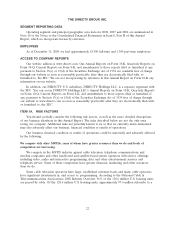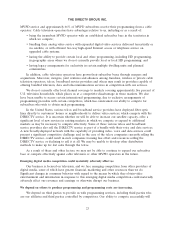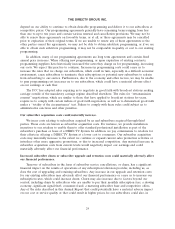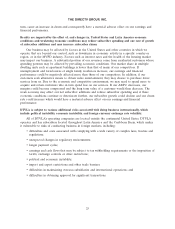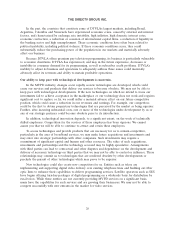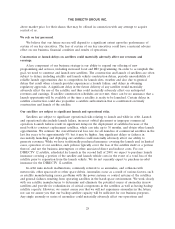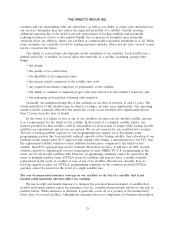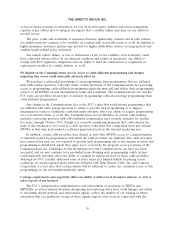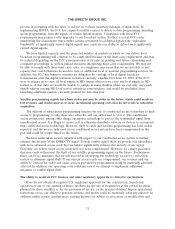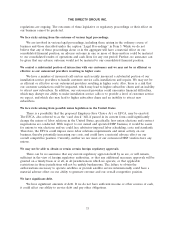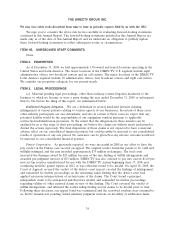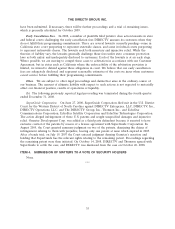DIRECTV 2008 Annual Report Download - page 39
Download and view the complete annual report
Please find page 39 of the 2008 DIRECTV annual report below. You can navigate through the pages in the report by either clicking on the pages listed below, or by using the keyword search tool below to find specific information within the annual report.THE DIRECTV GROUP, INC.
In the past, the countries that constitute some of DTVLA’s largest markets, including Brazil,
Argentina, Colombia and Venezuela have experienced economic crises, caused by external and internal
factors, and characterized by exchange rate instability, high inflation, high domestic interest rates,
economic contraction, a reduction or cessation of international capital flows, a reduction of liquidity in
the banking sector and high unemployment. These economic conditions have often been related to
political instability, including political violence. If these economic conditions recur, they could
substantially reduce the purchasing power of the population in our markets and materially adversely
affect our business.
Because DTVLA offers premium pay television programming, its business is particularly vulnerable
to economic downturns. DTVLA has experienced, and may in the future experience, decreases or
instability in consumer demand for its programming, as well as subscriber credit problems. DTVLA’s
inability to adjust its business and operations to adequately address these issues could materially
adversely affect its revenues and ability to sustain profitable operations.
Our ability to keep pace with technological developments is uncertain.
In the MVPD industry, changes occur rapidly as new technologies are developed, which could
cause our services and products that deliver our services to become obsolete. We may not be able to
keep pace with technological developments. If the new technologies on which we intend to focus our
investments fail to achieve acceptance in the marketplace or our technology does not work and requires
significant cost to replace or fix, we could suffer a material adverse effect on our future competitive
position, which could cause a reduction in our revenues and earnings. For example, our competitors
could be the first to obtain proprietary technologies that are perceived by the market as being superior.
Further, after incurring substantial costs, one or more of the technologies under development by us or
any of our strategic partners could become obsolete prior to its introduction.
In addition, technological innovation depends, to a significant extent, on the work of technically
skilled employees. Competition for the services of these employees has been vigorous. We cannot
assure you that we will be able to continue to attract and retain these employees.
To access technologies and provide products that are necessary for us to remain competitive,
particularly in the area of broadband services, we may make future acquisitions and investments and
may enter into strategic partnerships with other companies. Such investments may require a
commitment of significant capital and human and other resources. The value of such acquisitions,
investments and partnerships and the technology accessed may be highly speculative. Arrangements
with third parties can lead to contractual and other disputes and dependence on the development and
delivery of necessary technology on third parties that we may not be able to control or influence. These
relationships may commit us to technologies that are rendered obsolete by other developments or
preclude the pursuit of other technologies which may prove to be superior.
New technologies could also create new competitors for us. Entities such as telcos are
implementing and supporting digital video delivery over existing telephone lines and building out fiber
optic lines to enhance their capabilities to deliver programming services. Satellite operators such as SES
have begun offering turn-key packages of digital programming on a wholesale basis for distribution by
rural telcos. While these entities are not currently providing MVPD services on a significant basis,
many have the capabilities for such services and are growing their businesses. We may not be able to
compete successfully with new entrants in the market for video services.
26


